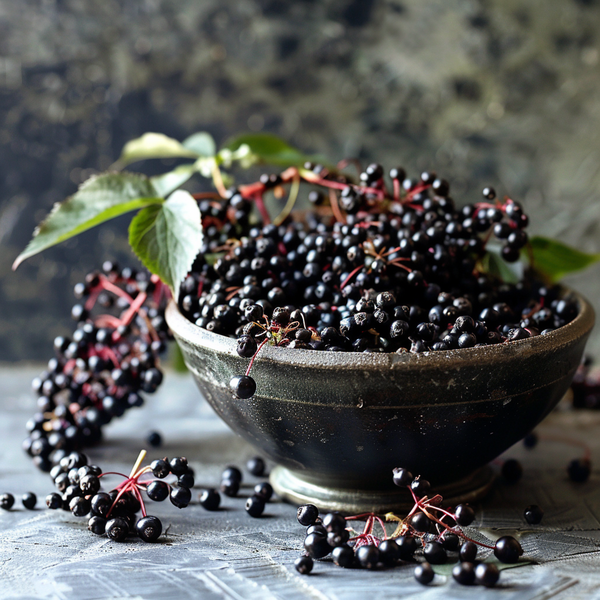
Elderberries
Elderberries are small, dark berries that come from the elder tree, known for their rich flavor and numerous health benefits, including boosting the immune system. They have a tart, tangy taste and are often used in cooking and traditional medicine once cooked or processed, as raw elderberries and other parts of the elder tree can be toxic. Here's how elderberries are commonly used in cooking:
Syrups and Elixirs: One of the most popular uses of elderberries is in making syrups and elixirs, which are believed to help prevent and ease cold and flu symptoms. These preparations often include honey, spices, and sometimes other medicinal herbs.
Jams, Jellies, and Preserves: Elderberries are well-suited for making jams, jellies, and preserves due to their high acid and pectin content. These can be used as spreads on bread and pastries or as a sweet-tart component in desserts.
Wines and Cordials: Elderberries have a long history of being used to make wine and cordials. The berries ferment well, producing a richly flavored, deep-colored wine that's enjoyed in many cultures.
Sauces and Condiments: Cooked elderberries can be reduced down into sauces and condiments, similar to cranberry sauce, which pair well with meats, especially game and poultry.
Baked Goods: Elderberries can be added to baked goods such as pies, tarts, muffins, and cakes, where they provide moisture and a burst of tangy flavor.
Teas: Dried elderberries can be used to make herbal teas, either on their own or blended with other herbs and spices. These teas are often consumed for their health benefits.
Desserts: Elderberries can be incorporated into desserts, including sorbets, ice creams, and fruit compotes, often sweetened to balance their natural tartness.
Savory Dishes: While less common, elderberries can be used in savory dishes, adding depth and acidity to stews, marinades, and dressings.
When using elderberries in cooking, it's essential to ensure they are fully ripe and cooked to avoid potential toxicity. Unripe berries and other parts of the plant contain compounds that can be harmful if ingested raw. Cooking the berries not only makes them safe to eat but also concentrates their flavors, making them a delightful addition to various recipes. Due to their health benefits and distinctive taste, elderberries have been valued in culinary and medicinal practices for centuries.
Nutritional Information
protein
0.66 g
calories
73
carbohydrates
18.4 g
fats
0.5 g